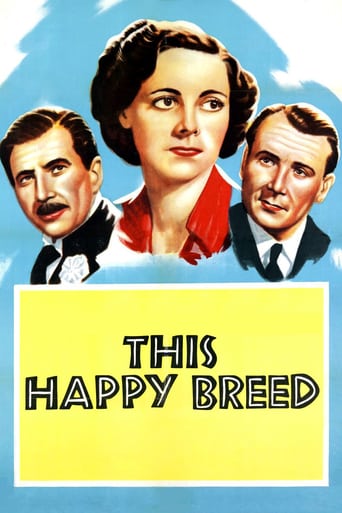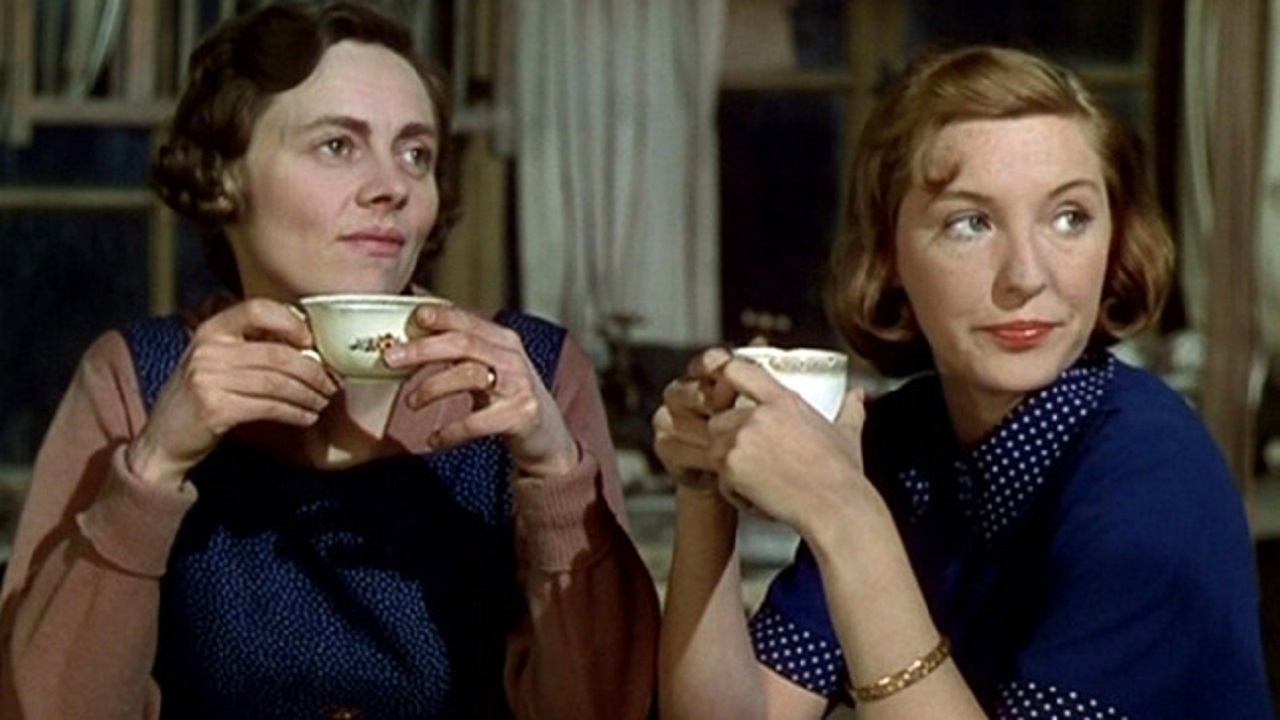JohnnyLee1
Title is surely ironic as the mostly unhappy Gibbons family outlasts its welcome. Despite its dramatic sweep, film is best appreciated as a comedy.
Reflects the conventional attitudes of the English lower middle class. At the General Strike the left-leaning son Reg is soon straightened out by his insufferable father while his Socialist friend also sees the error of his ways and settles down to a humdrum middle-class existence that is seen as the ultimate goal.
Pity it skirts around the real inter-war issues. It doesn't challenge the conventions. It could have shown the effects of war on that generation but obviously just wants to paint a superficial picture. A cuppa solves everything. This sort of thing would be the fodder of second-rate TV soap-operas. John Mills, Celia Johnson and Stanley Holloway stand out.
Richard Burton characterised writer Noel Coward as a lovely man with a "slight mind." That helps me understand the lost opportunity here to put the inter-war years into some sort of real perspective. But it also makes me wonder how the same team a couple of years later produced the masterpiece that is Brief Encounter!
overthetopandhappybso
i love This Happy Breed for so many reasons, not least of them being curling up on the sofa on a drizzly afternoon to watch it with my dear mum. along with brief encounter this is one of my all time favourite films. John Mills, Kay Walsh, Celia Johnson, Stanley Holloway and Robert Newton are brilliant, and by the time the credits roll, i feel as though i've been through their ups and downs, their laughter and tears with them. the interaction between the spinster sister and the old girl always makes me smile, as does the Christmas scene with the family gathered round the piano, watch the son in particular. in my humble opinion this is definitely another David Lean classic, and not to be missed if like me you enjoy glimpses into a bygone era. oh, and a little mention should be made of Percy, he had his paws buttered like the true professional he very clearly was.
bkoganbing
Kind of overlapping the era of British history that his previous work Cavalcade had covered, Noel Coward wrote one of his most popular plays in The Happy Breed which premiered in London in 1942 as Great Britain was fighting for its life. This film adaption coming as it did in 1944 when the tide of the war had turned, almost seems to justify Coward's faith in his country and the pluck of its people.The image we have today of Noel Coward is the ultra-sophisticate hanging around with royalty and other titled folks, amusing them with a sample of his acclaimed wit. But the kind of middle class background that the Gibbons and their neighbors the Mitchells come from is exactly where Noel Coward had his roots. His early years are covered in Cavalcade and the years overlap into This Happy Breed. Both films really ought to be seen back to back as a great sample of British social history.Newly discharged veteran from the Great War, Robert Newton and his wife Celia Johnson buy their dream house on Sycamore Lane to raise their three children. By chance their neighbors happen to be Stanley Holloway, Newton's wartime buddy and his family the Mitchells. The film is the story of the Mitchells and the Gibbons and how their lives interconnect in the years between the World Wars. Their family situations are seen against the backdrop of the events of the times like the General Strike, the Depression and the formation of the Coalition National Government to fight it, and the death of King George V.Anyone who expects the eye rolling Blackbeard from Robert Newton will be pleasantly surprised. Newton could be restrained if he had to, and in David Lean he certainly had a director that would rein in his excesses if it were ever necessary. What surprised me was that Noel Coward himself played the lead when This Happy Breed debuted in London. I certainly would have liked to have seen Coward's interpretation of the part.Kay Walsh who was Mrs. David Lean at the time played the elder daughter Queenie for Newton and Johnson. John Mills who is a career Navy man and Holloway's son loves Walsh, but she's a naughty thing and out for a good time. Let's say I think Mills just might qualify for sainthood in his performance with what he put up with.This Happy Breed is a great play with average folks that Mr. Average American, let alone Mr. Average British could identify with and it's great social commentary of an important era in history.
Jem Odewahn
A decent second film from David Lean, who would go on to direct some of the greatest films of all time. As with his other early films, Lean's material is a Noel Coward play. The film follows the lives of a middle class family between the Wars. As this film was released into a Britain battling overseas, it seems to be encouraging solidarity on the homefront, and the holding up of middle class values. But this is different from usual Noel Coward, and it's message is a little confused. One male character's liberalist ideas are seemingly stultified by a wife and kids, and he's encouraged just to live a normal, somewhat dreary suburban life. Spoiled daughter Queenie (Kay Walsh) wants to ascend to the upper class and live rich, but she meekly marries sailor John Mills (too old for the role, but still good). Coward seems to be virtually discouraging any movement out of a quiet suburban stratosphere. Every character seems to have to settle for what they don't want.Celia Johnson (who would give one of the greatest female performances of all time in Lean's later "Brief Encounter") is excellent and very authentic as the mother. Robert Newton proves he can be subtle as well as eye-poppingly grandiose in his portrayal of the patriarchy of the family. Ronald Neame's Technicolour is very nice, but it lacks any atmosphere or particular "look" to it. I prefer the black-and-white mastery of "Brief Encounter", "Great Expectations" and "Madeleine". I liked the film, but there is nothing particularly interesting about the characters and it all just hums along. Better things were to come from David Lean in later years.



 AD
AD




